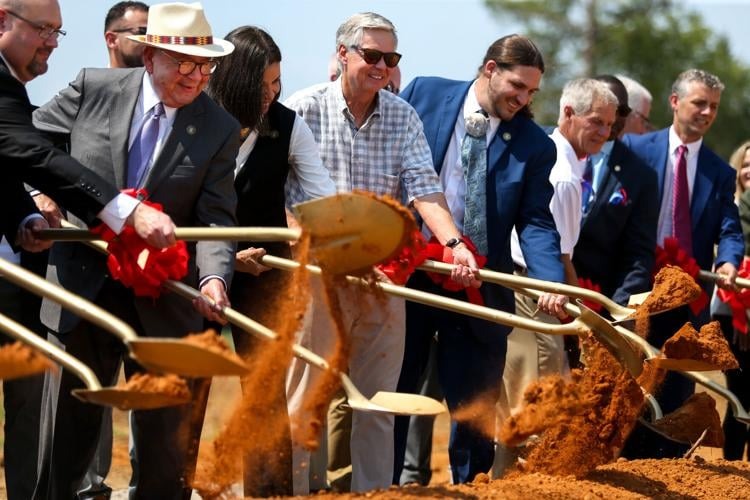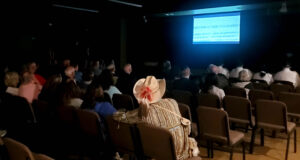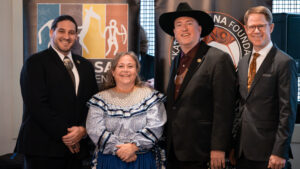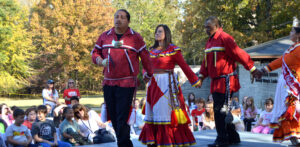No products in the cart.

Chickasaw Nation breaks ground on Heritage Center in Tupelo
TUPELO [Daily Journal] — In the heart of the historic Chickasaw homeland, near a village that once housed families of the prosperous nation, advocates and the Chickasaw Nation plan to build a museum commemorating its history through its eyes.
Residents, local officials, advocates and tribal leaders met Wednesday morning to break ground on the long-awaited Chickasaw Heritage Center, which will be located off of the Natchez Trace Parkway at the Chickasaw Village site.
“This land we stand on today is Chickasaw land. We know our ancestors are here on this land and that they are with us. We offer our thanks to them,” Chickasaw linguist Josh Hinson said, praying in both the Chickasaw language and English.
Chickasaw Inkana Foundation, a local nonprofit dedicated to preserving Chickasaw heritage and working as a liaison for the nation and local government, alongside the nation began work on the center many years ago with a concerted fund raising effort coming to fruition. With construction beginning, Chickasaw Inkana Foundation Chief Executive Officer Brady Davis said the target date to open the center will be in late 2026.
Davis said the center will provide the resources and expertise needed to guide the preservation and communication of the nation’s history, noting that over the years, there has been an increase increased interest in the culture, but without the resources needed, led to the story being told through a non-native perspective.
“While these attempts have proven very valuable and sincere, we know have the opportunity to share the rich history and culture of the Chickasaw people through their distinct lens with the establishment of the Chickasaw Heritage Center,” he said. “This project has been a cherished dream for decades. It fills me with immense pride to stand before you and witness this taking root.”
Between local, state, Chickasaw Nation, the foundation and business and individual donation, the project has raised millions in funding, including $16 million from the Chickasaw Nation, $11 million from the state of Mississippi and $500,000 raised by the foundation locally in personal donations. The foundation also pledged $10 million to cover costs.
The foundation is also looking to garner more donations for the project, which has an estimated cost of $60 million.
Chickasaw Nation Governor Bill Anoatubby said the project could not have moved forward without the help of partnerships.
“We tried it once, and it didn’t work,” Anoatubby said.
Tupelo was the heart of the Chickasaw Nation, which spanned Northeast Mississippi, as well as neighboring northwest Alabama, west Tennessee and southwest Kentucky, before the U.S. government forcibly removed them from their homeland in the 1830s.
This center, Anoatubby said, like the center in the Nation’s seat in Oklahoma, will strive to educate and inspire generations about the Chickasaw Nation’s culture and its history pre-colonialization and on.
“Our ancestors continue to teach us and others so much about life and liberty. We believe the many future visitors to this Chickasaw Heritage Center will enjoy a great deal of learning and inspiration… They will leave enriched by our ancestors’ unique perspective and way of life,” Anoatubby said. “This means so much to the Chickasaw people and nation.”
Construction will occur in two phases. The first will include construction of the lobby exhibit hall, gift shop, a multiple purpose room, collections management, and administrative offices. Phase 2 will include a theater and a cafe.
Gerald Spangler, Exhibit Concepts vice president of project management, who assisted in the exhibit’s design, said it was important to look through the perspective of a visitor when crafting an exhibit such as this to cause the visitor to take positive action
“It starts out with the research … It is the research, understanding the story, and throughout that time, we are looking to support the story with physical elements,” he said. “What’s important to the visitor? What’s going to perpetuate that story? What is going to cause that visitor to take action in a positive way to either further the story, understand the story, share the story?”
Former Tupelo Mayor Jack Reed Jr. serves on the Chickasaw Inkana Foundation board of directors and helped with an enormous chunk of fundraising on the project. He said this is the first museum of its kind that he knows of in the state and is proud to have been a part of its planning and construction. He noted that the foundation is still fundraising for the project and that individuals can visit the chickasawheritagecenter.com and donate to receive a charter membership.
“It doesn’t take a fortune to be a part of (the project),” he said.
The center is projected to have over 100,000 visitors annually, create at least 25 jobs and generate between $5 to $6 million in revenue.
Natchez Trace Parkway Superintendent Doug Neighbor said he is the latest in a long line of superintendents that have assisted in this project, noting that he believes the center will be the benchmark for future museums dedicated to telling the stories of first Americans.
Davis thanked the city of Tupelo, the community and the state for their support. Those interested in giving can go to inkana.org or chickasawheritagecenter.com.


